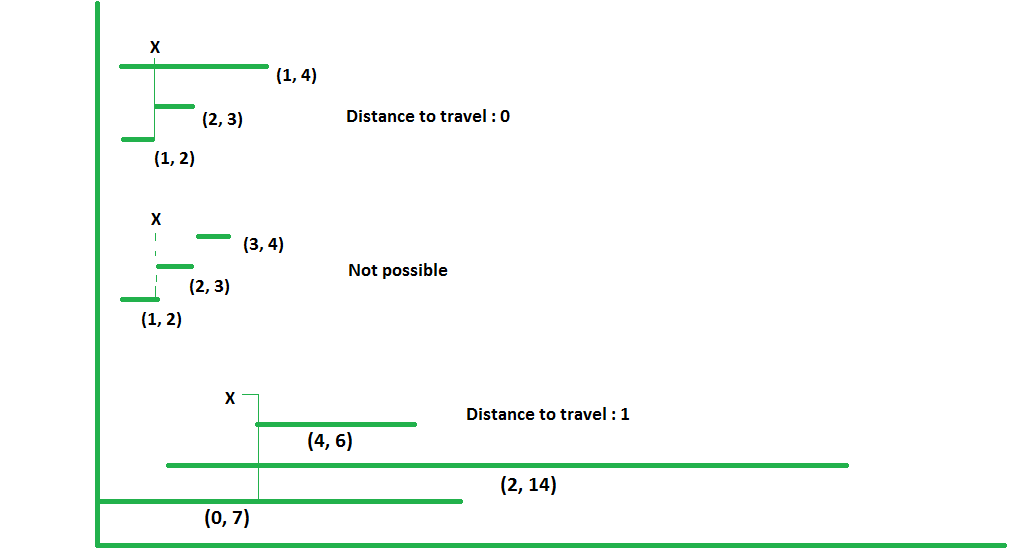给定许多区间作为范围和我们的位置。我们需要找到最小距离才能到达可以覆盖所有时间间隔的点。
例子:
Input : Intervals = [(0, 7), (2, 14), (4, 6)]
Position = 3
Output : 1
We can reach position 4 by traveling
distance 1, at which all intervals will
be covered. So answer will be 1
Input : Intervals = [(1, 2), (2, 3), (3, 4)]
Position = 2
Output : -1
It is not possible to cover all intervals
at once at any point
Input : Intervals = [(1, 2), (2, 3), (1, 4)]
Position = 2
Output : 0
All Intervals are covered at current
position only so no need travel and
answer will be 0
All above examples are shown in below diagram.
我们可以只关注端点来解决此问题。由于要求是通过到达一个点来覆盖所有间隔,因此所有间隔必须共享一个点才能存在答案。甚至具有最左边终点的间隔也必须与最右边起点的间隔重叠。
首先,我们从所有间隔中找到最右边的起点和最左边的终点。然后,我们可以将我们的位置与这些点进行比较,以获得结果,如下所述:
- 如果最右边的起点在最左边的终点的右边,则不可能同时覆盖所有间隔。 (如示例2所示)
- 如果我们的位置位于最右端和最左端之间的中间位置,则无需行驶,并且所有间隔都将仅由当前位置覆盖(如示例3所示)
- 如果我们的位置都留在这两个点,那么我们需要向上移动到最右边的起点,如果我们的位置对这两个点都在右边,那么我们需要向上移动到最左边的终点。
请参考上图以了解这些情况。与第一个示例一样,最右边的开始是4,最左边的结束是6,因此我们需要从当前位置3到达4,以覆盖所有间隔。
请参阅下面的代码以更好地理解。
C++
// C++ program to find minimum distance to
// travel to cover all intervals
#include
using namespace std;
// structure to store an interval
struct Interval
{
int start, end;
Interval(int start, int end) : start(start),
end(end)
{}
};
// Method returns minimum distance to travel
// to cover all intervals
int minDistanceToCoverIntervals(Interval intervals[],
int N, int x)
{
int rightMostStart = INT_MIN;
int leftMostEnd = INT_MAX;
// looping over all intervals to get right most
// start and left most end
for (int i = 0; i < N; i++)
{
if (rightMostStart < intervals[i].start)
rightMostStart = intervals[i].start;
if (leftMostEnd > intervals[i].end)
leftMostEnd = intervals[i].end;
}
int res;
/* if rightmost start > leftmost end then all
intervals are not aligned and it is not
possible to cover all of them */
if (rightMostStart > leftMostEnd)
res = -1;
// if x is in between rightmoststart and
// leftmostend then no need to travel any distance
else if (rightMostStart <= x && x <= leftMostEnd)
res = 0;
// choose minimum according to current position x
else
res = (x < rightMostStart) ? (rightMostStart - x) :
(x - leftMostEnd);
return res;
}
// Driver code to test above methods
int main()
{
int x = 3;
Interval intervals[] = {{0, 7}, {2, 14}, {4, 6}};
int N = sizeof(intervals) / sizeof(intervals[0]);
int res = minDistanceToCoverIntervals(intervals, N, x);
if (res == -1)
cout << "Not Possible to cover all intervals\n";
else
cout << res << endl;
} Java
// Java program to find minimum distance
// to travel to cover all intervals
import java.util.*;
class GFG{
// Structure to store an interval
static class Interval
{
int start, end;
Interval(int start, int end)
{
this.start = start;
this.end = end;
}
};
// Method returns minimum distance to
// travel to cover all intervals
static int minDistanceToCoverIntervals(Interval intervals[],
int N, int x)
{
int rightMostStart = Integer.MIN_VALUE;
int leftMostEnd = Integer.MAX_VALUE;
// Looping over all intervals to get
// right most start and left most end
for(int i = 0; i < N; i++)
{
if (rightMostStart < intervals[i].start)
rightMostStart = intervals[i].start;
if (leftMostEnd > intervals[i].end)
leftMostEnd = intervals[i].end;
}
int res;
// If rightmost start > leftmost end then
// all intervals are not aligned and it
// is not possible to cover all of them
if (rightMostStart > leftMostEnd)
res = -1;
// If x is in between rightmoststart and
// leftmostend then no need to travel
// any distance
else if (rightMostStart <= x &&
x <= leftMostEnd)
res = 0;
// Choose minimum according to
// current position x
else
res = (x < rightMostStart) ?
(rightMostStart - x) :
(x - leftMostEnd);
return res;
}
// Driver code
public static void main(String[] args)
{
int x = 3;
Interval []intervals = { new Interval(0, 7),
new Interval(2, 14),
new Interval(4, 6) };
int N = intervals.length;
int res = minDistanceToCoverIntervals(
intervals, N, x);
if (res == -1)
System.out.print("Not Possible to " +
"cover all intervals\n");
else
System.out.print(res + "\n");
}
}
// This code is contributed by Rajput-JiC#
// C# program to find minimum distance
// to travel to cover all intervals
using System;
class GFG{
// Structure to store an interval
public class Interval
{
public int start, end;
public Interval(int start, int end)
{
this.start = start;
this.end = end;
}
};
// Method returns minimum distance to
// travel to cover all intervals
static int minDistanceToCoverIntervals(
Interval []intervals, int N, int x)
{
int rightMostStart = int.MinValue;
int leftMostEnd = int.MaxValue;
// Looping over all intervals to get
// right most start and left most end
for(int i = 0; i < N; i++)
{
if (rightMostStart < intervals[i].start)
rightMostStart = intervals[i].start;
if (leftMostEnd > intervals[i].end)
leftMostEnd = intervals[i].end;
}
int res;
// If rightmost start > leftmost end then
// all intervals are not aligned and it
// is not possible to cover all of them
if (rightMostStart > leftMostEnd)
res = -1;
// If x is in between rightmoststart and
// leftmostend then no need to travel
// any distance
else if (rightMostStart <= x &&
x <= leftMostEnd)
res = 0;
// Choose minimum according to
// current position x
else
res = (x < rightMostStart) ?
(rightMostStart - x) :
(x - leftMostEnd);
return res;
}
// Driver code
public static void Main(String[] args)
{
int x = 3;
Interval []intervals = { new Interval(0, 7),
new Interval(2, 14),
new Interval(4, 6) };
int N = intervals.Length;
int res = minDistanceToCoverIntervals(
intervals, N, x);
if (res == -1)
Console.Write("Not Possible to " +
"cover all intervals\n");
else
Console.Write(res + "\n");
}
}
// This code is contributed by shikhasingrajput输出:
1